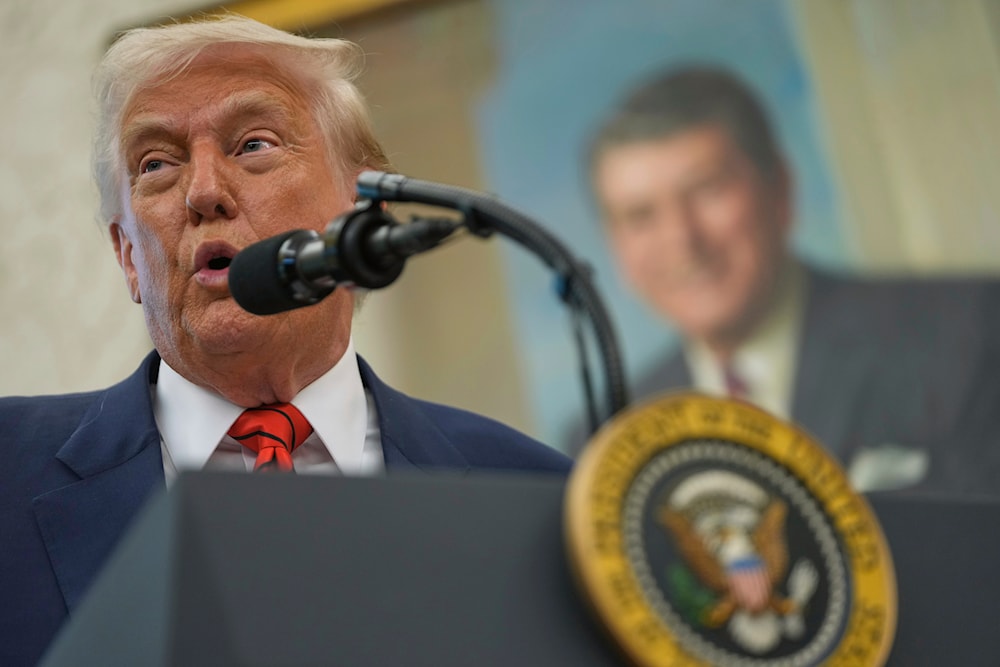Trump team urged Ukraine to take 3rd country US deportees amid war: WP
Documents reveal the Trump administration’s push to deport third-country nationals to nations like Ukraine and Rwanda, exposing unorthodox immigration tactics and diplomatic bargaining.
-

US President Donald Trump speaks before Steve Witkoff is sworn as special envoy during a ceremony in the Oval Office of the White House, on May 6, 2025, in Washington. (AP Photo/Mark Schiefelbein)
The Washington Post (WP) reported on Tuesday that the Trump administration’s third-country deportation policy extended its reach to countries at war or with fragile governments, including Ukraine, Rwanda, and Uzbekistan, according to documents.
The effort was part of a broader strategy to reshape the Trump administration's immigration policy through unconventional and often politically sensitive foreign arrangements.
In January, senior US officials urged the Ukrainian government to accept an unspecified number of deportees from the United States, foreign nationals who were not Ukrainian citizens, according to the report.
Documents do not confirm how Kiev responded, but a Ukrainian diplomat told the US Embassy that the government would respond after developing a position. According to two Ukrainian officials, the matter never reached the highest levels of government, and there was no indication of serious consideration, as reported by WP.
The proposal marked a striking example of the US deportation deals with Ukraine, made during a period of extreme national crisis.
Broader immigration strategy involving incentives and threats
The Trump administration aimed to dramatically expand the number of countries willing to accept nationals deported from the United States, while documents from January to May show that the administration pursued these agreements actively, often using diplomatic leverage, offers of financial assistance, or improved relations as incentives.
According to WP, several Latin American countries, including El Salvador, Mexico, Costa Rica, and Panama, agreed to accept non-national deportees, and some were incentivized with aid or White House invitations, while others were pressured with threats like tariff hikes or Panama Canal leverage.
A notable example of this strategy was a Rwanda deportation agreement, in which the US paid the Rwandan government $100,000 to accept a single deported Iraqi, and Rwanda agreed to take an additional ten deportees of various nationalities as part of a broader cooperation program.
According to documents, Rwandan leaders were motivated by the will to demonstrate alignment with Trump’s “America First” approach.
US officials used strategic leverage with countries like Uzbekistan and Georgia
Documents reveal the Trump administration considered using Uzbekistan as a transit hub for deporting individuals from Russia and Belarus, offering incentives like high-level calls, despite severed flights and regional tensions, as reported by WP.
Last week, over 100 deportees, including Kazakh and Kyrgyz nationals, were flown to Uzbekistan, highlighting US efforts to establish deportation routes in sensitive areas.
According to WP, officials warned such deals could be exploited by "adversaries like China and Russia", while talks were also initiated with Georgia, even though no agreements have been confirmed.
Additionally, a Ukrainian diplomat objected to new deportation proposals due to wartime conditions, calling them unprecedented. That said, Trump reportedly saw Ukraine’s dependence on US aid as leverage, leading to a February Oval Office clash with Zelensky that eased only after Kiev granted the US access to critical minerals.

 3 Min Read
3 Min Read








